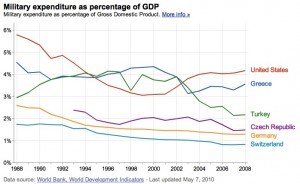




 A revolutionary answer to militarism in the framework of the Euro crisis
A revolutionary answer to militarism in the framework of the Euro crisis
The Greek government – and the European Union and the International Monetary Fund behind it – justifies its massive program of cuts against the working population of Greece with the need to make “painful sacrifices” in order to save the country.
At the same time, however, the German and French governments demand that the Greek government fulfill all its contractual obligations for weapons purchases, continuing to pay for submarines and tanks ordered from European arms manufacturers.
Militarism and the Crisis
In a statement about the crisis in Greece, we from RIO, the Revolutionary Internationalist Organization, raised the demand: “Greece’s extremely high spending for the military must be cancelled and replaced by the arming of the population.” (1) We would like to expand about the question of militarism in the framework of the Euro crisis.
Greece, because of its ongoing hostilities with Turkey, has an extremely high military budget: In 2008, Greece spent roughly 10 billion US$ on its military (2). Military spending as a percentage of gross domestic product – 3.55% – is higher than in any other country in Europe.
A chart comparing Greece to the United States, its “arch-enemy” Turkey and several other European countries makes this particularly clear (3). (This chart, by the way, also shows that a militia system – even Switzerland’s bourgeois militia system with a professional officer corps – is cheaper than a standing army. Switzerland has slightly more active troops than Greece despite spending a drastically lower percentage of its GDP on the military.)

This decades-old arms race between Greece and Turkey reinforces chauvinism amongst working people on both sides of the Aegis. While workers are told to accept cuts in wages, pensions, and social services, billions are given to arms manufacturers – principally German and French, but also American and Israeli companies – for ever-newer weapons.
Both Greece and Turkey are members of NATO, which officially prohibits any hostilities between member countries. But no treaty between capitalist states can eliminate the danger of war, only postpone it in order to prepare new, more devastating wars.
Revolutionary and Pacifist Positions
This question is being discussed amongst the left and the workers’ movement in Greece and Turkey. For example, in a statement distributed at the European Social Forum in Istanbul, the United Secretariat of the Fourth International declared: “the Greek and Turkish sections of the Fourth International demand the immediate and decisive reduction in military spending and the cancellation of existing arms purchases in both countries.” (4)
They correctly state: “only the working classes in Turkey and Greece can really solve theses issues [of military spending] and do it once and for all.” However, this statement does not describe how the working classes cold solve this problem, and is instead limited to the minimum demand: “We demand that this reduction is implemented unilaterally in our respective countries.”
In the context of the crisis, it is progressive to call for a reduction of the military budget. However, this call by itself is a pacifist and not a revolutionary slogan. And while fighting against all imperialist wars, Marxists also need to consistently fight pacifist illusions.
The simple truth is that under capitalism there can be no lasting peace: the only way to end wars is a revolutionary war against the capitalist classes of every country. Revolutionaries must prepare for this class war – not so much in a military sense (since small groups taking up arms at this conjecture in the class struggle only leads to their isolation from the working masses – and in a revolutionary situation, it is usually not hard to find weapons) as in a political sense, i.e. preparing the workers’ vanguard for this inevitable conflict.
The statement of RIO calls for a revolutionary workers’ government in Greece. This is the only “practical solution” for the working population to reject the countless attacks on their standards of living. But such a government would need to break the resistance of the bourgeoisie – in Greece, the EU and internationally. All historical experience shows that the capitalist classes will use all means at their disposal – including their massive armies – to crush the workers’ movement when it attempts to take over the means of production and re-organize society in its interests.
The Revolutionary Antimilitarist Tradition
This debate is not new amongst Marxists. During the First World War, left-wing socialists gathered in the Zimmerwald Interantional were divided about whether to use pacifist or revolutionary slogans. While the Zimmerwald majority argued for “disarmament” and similar demands, the Zimmerwald left around the Russian Bolsheviks called for the “transformation of the imperialist war into a civil war”.
Opposing pacifism, V.I. Lenin wrote in 1916: “Socialists cannot, without ceasing to be socialists, be opposed to all war. Firstly, socialists have never been, nor can they ever be, opposed to revolutionary wars. The bourgeoisie of the imperialist ‘Great’ Powers has become thoroughly reactionary, and the war this bourgeoisie is now waging we regard as a reactionary, slave-owners’ and criminal war. But what about a war against this bourgeoisie? A war, for instance, waged by peoples oppressed by and dependent upon this bourgeoisie, or by colonial peoples, for liberation?” (5)
Lenin recognized clearly that to prepare for such a war, the working class needs to arm itself. He argued that under certain conditions, revolutionaries would even fight for “defense of the fatherland”: “The term ‘defense of the fatherland’, for instance, is hateful to many because both avowed opportunists and Kautskyites use it to cover up and gloss over the bourgeois lie about the present predatory war. This is a fact. (…) To accept ‘defense of the fatherland’ in the present war is no more nor less than to accept it as a ‘just’ war, a war in the interests of the proletariat—no more nor less, we repeat, because invasions may occur in any war. It would be sheer folly to repudiate ‘defense of the fatherland’ on the part of oppressed nations in their wars against the imperialist Great Powers, or on the part of a victorious proletariat in its war against some Galliffet of a bourgeois state” (6)
When the Communist Youth International was founded in November 1919, there was no agreement about the question of disarmament. Only in June 1920 did the CYI decide on clearly revolutionary positions, writing: “The demand for disarmament is (…) counterrevolutionary because it deceives the working class about the necessary armed conflict with the bourgeoisie, awakens illusions about a peaceful transition to socialism and hampers the necessary revolutionary propaganda and preparation of the workers, while the bourgeoisie remains in unrestricted possession of weapons and is daily capable of using them against the workers.” (7)
Agitation and Propaganda in the Crisis
As revolutionaries, we need to argue for a workers’ answer to the Euro crisis while at the same time patiently and unambiguously explaining the need for breaking the capitalists’ organs of power (police, army, state bureaucracy and politically preparing the working class for a revolutionary civil war.
The heightened class struggle in Greece offers revolutionaries the possibility to propagate this demand with a system of transitional demands. Against the calls for “painful sacrifices”, we must argue that we are willing to “sacrifice” the bourgeoisie’s army!
The task of the moment is to organize self-defense of the protest movement against police violence as well as state and fascist provocateurs. This can start with the organization of self-defense groups of workers and youth to protect demonstrations and strikes – and we have seen steps in this direction on May 5, 2010, for example, when for hours demonstrators were trying to storm the parliament in Athens.
This basic agitation for self-defense – which is being carried out by the OKDE, but not, unfortunately, by all Communist or Trotskyist organizations – needs to be combined with propaganda for the destruction of the bourgeois army and its replacement by a workers’ militia. If we convince vanguard layers of the workers and youth to organize to fight back against the police, it is only a small step to pose the question: What do we need the police for? Why do we need not only the expensive weapons but a bourgeois army in the first place?
by Wladek Flakin, RIO, Berlin, July 7, 2010
Notes
(1) RIO: The Greek Spectre.
(2) List of countries by military expenditures
(3) Military expenditure as percentage of GDP
(4) Yeniyol and OKDE Spartakos: “Unilateral reduction of military spending!” In: “6th European Social Forum.” Newspaper of the Fourth International. P. 2.
(5) V.I. Lenin: “The Military Program of the Proletarian Revolution.”
(6) Ibid. Gallifet was a general involved in crushing the Paris Commune.
(7) Communist Youth International: Theses about the Antimilitarist Tactics of the Communist Youth Organizations. Our translation.
For more about the development of these theses, see: Wladek Flakin: “The ‘Berliner Years’ of the Communist Youth International.” In: Permanent Revolution. #16. London 2010.
Leave a Reply
